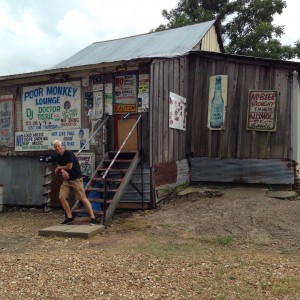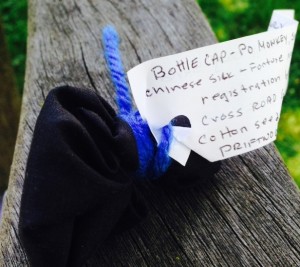Mississippi: The Most Southern Place
This blog was written before the recent horrible events at Delta State University. My thoughts are with the community and its many warm and kind people.
 A few years back I recognized that I was getting stale—not bad, just not good—and that I was becoming calcified in my self-assurance. I don’t remember an exact moment when I noticed it. In any case, I didn’t want to become the teacher who boasts 20 years of experience, when he really means two years of experience repeated 10 times. I looked around until I found a seminar given by Columbia University and Theater for a New Audience, on teaching Shakespeare. I applied and was lucky enough to get in.
A few years back I recognized that I was getting stale—not bad, just not good—and that I was becoming calcified in my self-assurance. I don’t remember an exact moment when I noticed it. In any case, I didn’t want to become the teacher who boasts 20 years of experience, when he really means two years of experience repeated 10 times. I looked around until I found a seminar given by Columbia University and Theater for a New Audience, on teaching Shakespeare. I applied and was lucky enough to get in.
That first experience took me apart. It changed everything about me and how I teach, and I’ve been addicted to seminars ever since. In the years since then, I’ve been all over the country, attending just about anything that’ll let me in. The results have varied from transformative to “at least I got a free poster.” I like it best when I come away changed, when I feel like the ground has shifted under my feet and I need to rebuild. For me, that’s the marker of effective professional development.
PD’s Broader Purpose
Sometimes, though, a seminar isn’t as much about learning a new approach or finding something to build into my own practice. It’s about the landscape and the people I meet. It’s about changing the way I think about myself, as a teacher, a student, and a human being.
I find that being around really good teachers—smart, inspired, creative, risk-taking teachers—is what changes me. I like being in the “learning chair”: the worst teacher in the room, the least informed person in the seminar. It means I’ll be learning.
 This year found me at Delta State University in Mississippi, “the most Southern place on Earth.” There, among outstanding teachers from all over the country, I spent an exhausting week working through everything that the Delta has to offer.
This year found me at Delta State University in Mississippi, “the most Southern place on Earth.” There, among outstanding teachers from all over the country, I spent an exhausting week working through everything that the Delta has to offer.
The Delta is a place of conflicted history and rich culture. Teachers and caretakers there are charged with the task of tending a dying region, while parceling out the memory to everyone they meet. And so this seminar fell into the category of ground shaking and attitude changing. It forced us to think about places almost none of us had visited, from an old cemetery for Chinese immigrants, to an aging Jewish synagogue, to Po’ Monkey’s Juke Joint, perhaps the last “true” juke joint in the Delta, and a place where people dance with abandon as the night grows late.
Rediscovering Mockingbird, in the Courtroom
One afternoon, my classmates and I were able to participate in a panel discussion on the Emmett Till case. On the panel were the last people, other than his murderers, to see Till alive: his uncle and an FBI agent who reopened that case in 2004. The discussion took place in the actual courtroom where the original miscarriage of justice occurred.
Those of us in the language arts huddled afterward to talk about the connections to To Kill a Mockingbird. Being in the place makes the emotions of the novel more real. The ghosts are real and the voices seem to seep in from the gallery, and I feel closer to the truth of the books I’ve taught for years.
Keeping Traditions Alive in the Classroom
 On our last day in the Delta, I made a mojo, a little pouch that contains bits and pieces of the places you visited, people you met, and sites you want to return to someday. You display it somewhere people will see it and ask about it, and every time you talk about it, the magic of the mojo gets stronger.
On our last day in the Delta, I made a mojo, a little pouch that contains bits and pieces of the places you visited, people you met, and sites you want to return to someday. You display it somewhere people will see it and ask about it, and every time you talk about it, the magic of the mojo gets stronger.
Like that mojo, Mississippi offered a strange mix for me. I didn’t walk away with a notebook full of new techniques—I did get some, though. But when I see a guest lecturer pick up a diddley bow—a guitar made out of a cigar box, broomstick, and a single string—and pull so much emotion out it while he teaches a class of rapt students about the history of the blues in the Delta, I understand how important passion is to teaching. I see how being able to demonstrate something, and let students try it themselves, makes learning so much richer.
Even though so much of what I saw showed me something that was slipping away, or already gone, I wasn’t sad. It’s another of those weird paradoxes of this place. All of the people I met have a sense of duty, to the past but also to the future. They tell stories to us, teachers from all over the United States, trusting that we will carry them back with us and teach them to our students, so that the sound of the blues, that heartbeat rhythm, won’t disappear.
 Rick Kreinbring teaches English at Avondale High School in Auburn Hills, Michigan. His current assignments include teaching AP Language and Composition and AP Literature and Composition. He is a member of a statewide research project through the Michigan Teachers as Researchers Collaborative partnered with the MSU Writing in Digital Environments Program, which concentrates on improving student writing and peer feedback. Rick has presented at the National Advanced Placement Convention and the National Council of Teachers of English Conference. He is in his twenty-third year of teaching and makes his home in Huntington Woods.
Rick Kreinbring teaches English at Avondale High School in Auburn Hills, Michigan. His current assignments include teaching AP Language and Composition and AP Literature and Composition. He is a member of a statewide research project through the Michigan Teachers as Researchers Collaborative partnered with the MSU Writing in Digital Environments Program, which concentrates on improving student writing and peer feedback. Rick has presented at the National Advanced Placement Convention and the National Council of Teachers of English Conference. He is in his twenty-third year of teaching and makes his home in Huntington Woods.
Notes from the Classroom Oakland Writing Project Professional Learning
